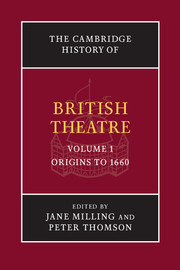Book contents
- Frontmatter
- PART I PRE-ELIZABETHAN THEATRE
- PART II ELIZABETHAN THEATRE
- 5 The development of a professional theatre, 1540–1660
- 6 Drama outside London after 1540
- 7 ‘An example of courtesy and liberality’: great households and performance
- 8 The birth of an industry
- 9 Theatre and controversy, 1572–1603
- 10 The condition of theatre in England in 1599
- 11 Ben Jonson's Every Man in his Humour: a Case Study
- 12 London professional playhouses and performances
- PART III JACOBEAN AND CAROLINE THEATRE
- Works Cited
- Index
- References
9 - Theatre and controversy, 1572–1603
from PART II - ELIZABETHAN THEATRE
Published online by Cambridge University Press: 28 March 2008
- Frontmatter
- PART I PRE-ELIZABETHAN THEATRE
- PART II ELIZABETHAN THEATRE
- 5 The development of a professional theatre, 1540–1660
- 6 Drama outside London after 1540
- 7 ‘An example of courtesy and liberality’: great households and performance
- 8 The birth of an industry
- 9 Theatre and controversy, 1572–1603
- 10 The condition of theatre in England in 1599
- 11 Ben Jonson's Every Man in his Humour: a Case Study
- 12 London professional playhouses and performances
- PART III JACOBEAN AND CAROLINE THEATRE
- Works Cited
- Index
- References
Summary
The sixteenth century was a time of great change. Inflation, expansion and new forms of mobility were challenging and displacing centuries-old patterns of social order, religious belief, political structure and economic value. The population of England and Wales grew by more than 45 per cent to over four million people in 1600. Land was enclosed, workers displaced and real wages for the poor declined; at the same time, more men had access to education, the state took control of religion without causing a full-scale civil war, and luxury goods poured in from newly accessible foreign lands. Interpreting the place of theatre within this flurry of activity is a complex task. To invoke an analogy popular among cultural critics, looking at sixteenth-century theatre is like looking at an anamorphic perspective painting such as Holbein's The Ambassadors : the first impression is one of profit and delight, but another image gradually emerges to complicate the picture. Viewed the more direct and obvious way, the last three decades of Elizabeth's reign inaugurated the great era of English drama. Professional theatre companies flourished and a remarkable variety of performance genres and styles came into being, producing great and memorable play scripts that have come to dominate the classical repertory of English-language theatre. But buried within this picture of artistic energy, productivity and innovation lies the skull, the reminder of what was dying and the sign of future problems that the rich surface could not entirely obscure.
- Type
- Chapter
- Information
- The Cambridge History of British Theatre , pp. 242 - 263Publisher: Cambridge University PressPrint publication year: 2004

